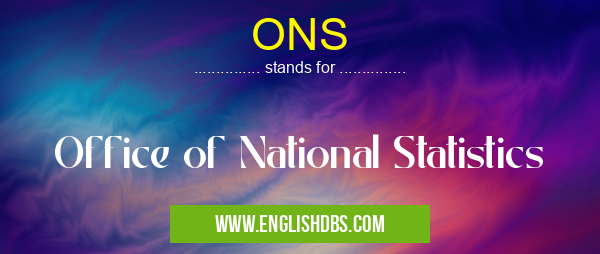What does ONS mean in STATISTICS
ONS is an abbreviation that stands for Office of National Statistics. It is a UK government department that is responsible for collecting and publishing statistical information on the economic, social and environmental aspects of the UK. The ONS is one of the largest statistical agencies in the world, and its data is used by a wide range of users, including government departments, businesses, researchers, and the general public.

ONS meaning in Statistics in Academic & Science
ONS mostly used in an acronym Statistics in Category Academic & Science that means Office of National Statistics
Shorthand: ONS,
Full Form: Office of National Statistics
For more information of "Office of National Statistics", see the section below.
What does ONS Stand for?
The full form of ONS is Office of National Statistics.
ONS Meaning in statistics
The ONS is responsible for producing a wide range of statistical information, including:
- Economic statistics: These statistics cover a wide range of topics, such as GDP, inflation, employment, and productivity.
- Social statistics: These statistics cover a wide range of topics, such as population, health, education, and crime.
- Environmental statistics: These statistics cover a wide range of topics, such as air quality, water quality, and waste disposal.
The ONS data is used by a wide range of users, including:
- Government departments: The ONS data is used by government departments to inform policy decisions.
- Businesses: The ONS data is used by businesses to make informed decisions about their operations.
- Researchers: The ONS data is used by researchers to conduct research on a wide range of topics.
- The general public: The ONS data is used by the general public to stay informed about the UK economy, society, and environment.
Essential Questions and Answers on Office of National Statistics in "SCIENCE»STATISTICS"
What is the Office of National Statistics (ONS)?
The ONS is the UK's official government agency responsible for collecting, analyzing, and disseminating statistical information about the social and economic conditions of the country. It provides data on a wide range of topics, including population, health, education, labor market, and the economy.
What types of data does the ONS collect?
The ONS collects a vast array of data, including:
- Population statistics (e.g., births, deaths, migration)
- Economic indicators (e.g., GDP, inflation, unemployment)
- Social statistics (e.g., health, education, crime)
- Environmental statistics (e.g., air pollution, waste management)
- Household surveys (e.g., income, expenditure, housing)
- Business surveys (e.g., production, investment, employment)
How does the ONS collect data? A: The ONS uses a variety of methods to collect data, including: Censuses: Large-scale surveys conducted at regular intervals (e.g., every 10 years) Sample surveys: Smaller-scale surveys that collect data from a representative sample of the population Administrative dat
The ONS uses a variety of methods to collect data, including:
- Censuses: Large-scale surveys conducted at regular intervals (e.g., every 10 years)
- Sample surveys: Smaller-scale surveys that collect data from a representative sample of the population
- Administrative data: Data collected from government records and other sources
- Data linkage: Combining data from different sources to create new insights
How can I access ONS data?
ONS data is available through a variety of channels, including:
- ONS website: https://www.ons.gov.uk/
- ONS data explorer: https://www.ons.gov.uk/explore/datasets
- Open data portal: https://data.gov.uk/
- Publications and reports: https://www.ons.gov.uk/publications
How can I contact the ONS? A: You can contact the ONS through: Email: [email protected] Phone: +44 (0)300 060 3900 Social medi
You can contact the ONS through:
- Email: [email protected]
- Phone: +44 (0)300 060 3900
- Social media: @ONS
- Contact form: https://www.ons.gov.uk/contact-us/help-and-information
Final Words: The ONS is a vital source of information about the UK economy, society, and environment. Its data is used by a wide range of users to make informed decisions.
ONS also stands for: |
|
| All stands for ONS |
